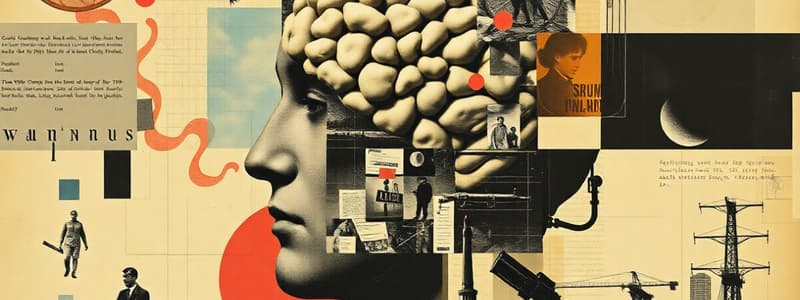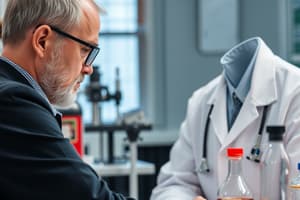Podcast
Questions and Answers
Psychology is the study of ______ and mental processes.
Psychology is the study of ______ and mental processes.
behavior
Commonsense psychology is ______ and subject to errors.
Commonsense psychology is ______ and subject to errors.
nonscientific
Psychological science shares the key features of all modern ______.
Psychological science shares the key features of all modern ______.
science
Science is the systematic gathering of data to provide ______ of events.
Science is the systematic gathering of data to provide ______ of events.
Science comes from the Latin word ______, which simply means knowledge.
Science comes from the Latin word ______, which simply means knowledge.
Experimental psychology is a ______ approach rather than a subject.
Experimental psychology is a ______ approach rather than a subject.
Experimental psychology utilizes ______ methods to research the mind and behavior.
Experimental psychology utilizes ______ methods to research the mind and behavior.
There are five main tools of the ______ approach.
There are five main tools of the ______ approach.
Stanley Hall opened the first experimental psychology lab in the United States in ______ at John Hopkins University.
Stanley Hall opened the first experimental psychology lab in the United States in ______ at John Hopkins University.
In 1891, ______ established an experimental psychology lab at Wellesley College, becoming the first woman to form a psychology lab.
In 1891, ______ established an experimental psychology lab at Wellesley College, becoming the first woman to form a psychology lab.
In 1893, G. Stanley Hall established the American ______ Association, the largest professional and scientific organization of psychologists in the US.
In 1893, G. Stanley Hall established the American ______ Association, the largest professional and scientific organization of psychologists in the US.
In 1920, John Watson and Rosalie Raynor conducted the famous ______ experiment, demonstrating emotional reactions could be classically conditioned.
In 1920, John Watson and Rosalie Raynor conducted the famous ______ experiment, demonstrating emotional reactions could be classically conditioned.
In 1961, ______ conducted the now famous Bobo Doll experiment, which demonstrated the effects of observation on aggressive behavior.
In 1961, ______ conducted the now famous Bobo Doll experiment, which demonstrated the effects of observation on aggressive behavior.
In an experiment, our predictions must be _____ for verification.
In an experiment, our predictions must be _____ for verification.
Replication involves repeating procedures and obtaining the same _____ .
Replication involves repeating procedures and obtaining the same _____ .
Hypothesis must be _____ in order to be scientifically valid.
Hypothesis must be _____ in order to be scientifically valid.
In psychology experiments, we create specific sets of _____ called treatments.
In psychology experiments, we create specific sets of _____ called treatments.
The psychology experiment is a controlled procedure that applies at least two different _____ conditions.
The psychology experiment is a controlled procedure that applies at least two different _____ conditions.
Good thinking means approaching data collection and interpretation in an organized and rational _____ .
Good thinking means approaching data collection and interpretation in an organized and rational _____ .
Control in experiments is necessary to ensure we are measuring what we intend to _____ .
Control in experiments is necessary to ensure we are measuring what we intend to _____ .
Psychological science was born in _____ when Wilhelm Wundt opened the first psychology laboratory.
Psychological science was born in _____ when Wilhelm Wundt opened the first psychology laboratory.
Flashcards
Experiment
Experiment
A systematic method to manipulate conditions and verify predictions about behavior.
Hypothesis
Hypothesis
A testable prediction about the outcome of an experiment.
Replication
Replication
Repeating an experiment to see if the same results occur.
Controlled Procedure
Controlled Procedure
Signup and view all the flashcards
Antecedent Conditions
Antecedent Conditions
Signup and view all the flashcards
Treatment Conditions
Treatment Conditions
Signup and view all the flashcards
Good Thinking
Good Thinking
Signup and view all the flashcards
Cause-and-Effect Relationship
Cause-and-Effect Relationship
Signup and view all the flashcards
Psychology
Psychology
Signup and view all the flashcards
Scientific Method
Scientific Method
Signup and view all the flashcards
Commonsense Psychology
Commonsense Psychology
Signup and view all the flashcards
Four Objectives of Psychology
Four Objectives of Psychology
Signup and view all the flashcards
Observation
Observation
Signup and view all the flashcards
Measurement
Measurement
Signup and view all the flashcards
Experimentation
Experimentation
Signup and view all the flashcards
Scientific Tools in Psychology
Scientific Tools in Psychology
Signup and view all the flashcards
First Experimental Psychology Lab
First Experimental Psychology Lab
Signup and view all the flashcards
Mary Whiton Calkins
Mary Whiton Calkins
Signup and view all the flashcards
American Psychological Association
American Psychological Association
Signup and view all the flashcards
Little Albert Experiment
Little Albert Experiment
Signup and view all the flashcards
Bobo Doll Experiment
Bobo Doll Experiment
Signup and view all the flashcards
Study Notes
Experimental Psychology and the Scientific Method
- Psychology is the study of behavior and mental processes
- Psychological research relies on scientific methodology
- Commonsense psychology is often nonscientific and prone to errors (e.g., Friday the 13th)
- Psychological science shares key features with all modern science, including:
- Gathering observable, objective data
- Seeking general laws or theories to explain relationships among data
Science Overview
- Science is the systematic collection of data to describe events under specific conditions
- Science aids in organizing, categorizing, and understanding the universe
- The Latin word "scientia" means "knowledge"
- Methodology is a basic tactic in psychological research, encompassing scientific techniques for collecting and evaluating data
Experimental Psychology
- Experimental psychology is a methodological approach, not a subject, encompassing diverse areas within psychology
- Experimental psychology uses scientific methods to research the mind and behavior
- Four primary objectives of psychological science:
- Description
- Prediction
- Explanation
- Control
Tools of Experimental Psychology
- Observation: Systematic noting and recording of observable events; non-observable events are studied through defining them in terms of observable events
- Measurement: Determining dimensions (height, width, etc.) of events or behaviors; standards are used to ensure accuracy
Experimentation
- Experimentation is a process to discover new things or demonstrate existing event patterns under specific conditions through the systematic manipulation of aspects of the setting
- Two fundamental requirements for experimentation:
- Procedures to manipulate the setting
- Observable predicted outcome (testable)
Additional Research Methods
- Good Thinking: Using logic and rational analysis to collect and interpret data
- Replication: Repeating procedures to ensure consistent results; objective observations, measurements, and good thinking are crucial
Conducting Experiments
- Requirements:
- Testable hypothesis
- Observable predicted outcome
- Measurable outcome
Explanations
- In science, explanations specify antecedent conditions (circumstances occurring before an event or behavior)
- Psychology includes conditions like food deprivation or childhood experiences as antecedent conditions
Psychology Experiments
- Psychology experiments create specific sets of antecedents (treatments)
- Psychology experiments are controlled procedures using at least two different treatment conditions for research subjects
Experimental Procedures
- Subjects' behaviors are measured and compared to test hypotheses about the effects of treatments
- The procedures of psychological experiments must be carefully controlled, maximizing accuracy of measurements
Cause-and-Effect
- Cause-and-effect relationships can be inferred between treatment conditions and subject behaviors
- Treatments can be considered as the cause of observed behaviors
History of Experimental Psychology
- Wilhelm Wundt started the field of psychology in 1879 in Leipzig, Germany with a psychology lab
- G. Stanley Hall initiated the first experimental psychology lab in the U.S. in 1883 at John Hopkins University
- James McKeen Cattell opened the third experimental psychology lab in 1887 at University of Pennsylvania
- Mary Whiton Calkins established an experimental psychology lab in 1891 at Wellesley College, becoming the first woman to establish a psychology lab
- In 1893, G. Stanley Hall established the American Psychological Association (APA)
Notable Experiments
- In 1920, John and Rosalie Raynor and their Little Albert experiment investigated the classical conditioning of emotional reactions in people
- In 1961, Albert Bandura led the Bobo Doll experiment, exploring the impact of observation on aggressive behavior
The Research Process
- A scientific approach starts with reviewing existing research to form a hypothesis about behavior.
- Procedures to test these hypotheses are designed.
- Data is analyzed using statistical methods to support or reject the hypothesis.
- A research report outlining methods and findings is written, providing insights to the field.
Studying That Suits You
Use AI to generate personalized quizzes and flashcards to suit your learning preferences.




